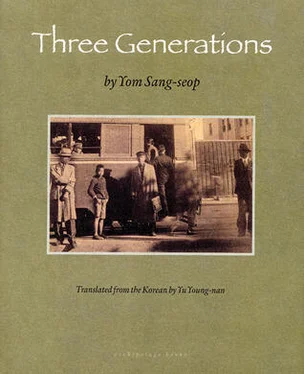“You, student, are you deaf? Do you have to walk so fast?” The maid addressed her as “student,” reluctant to accord Pil-sun a higher level of respect. Sensing that Pil-sun wasn’t someone to whom she had to defer, judging from the way she was dressed, the maid didn’t think twice about criticizing her for her pace. “The master wants you to come in.” She sounded as if she were blaming Pil-sun for the invitation.
“But I have nothing special to tell him.” Pil-sun’s face flushed.
“You can’t leave. It doesn’t matter whether you have something to tell him or not. Don’t get me into trouble.”
Pil-sun sensed that the maid was making fun of her. As she stood with her head bowed, the maid said, “It’s freezing out here. You can’t just stand there. Nobody’s asking you to kneel before him. What’s there to be embarrassed about? You can stand outside his window and listen to what he has to say.”
Pil-sun followed the maid in silence. It would be foolish to leave when she was there to pay her respects to a sick man. The truth was she was eager to see him, and though she was ashamed to admit it, she was curious to see the grand house.
Pil-sun stopped at the high stone step before the veranda, unsure which room she should enter. It was fortunate that the big house was as quiet as a Buddhist temple and that no eyes were on her. She had imagined that it would be bustling with people.
“Come in, please.” Deok-gi saw her from the main-room window.
Flustered, she stepped up to the veranda and entered the room. Had she haphazardly flung off her shoes on the shoe ledge instead of lining them up neatly?
“It’s cold out, isn’t it? Have a seat.” Deok-gi was cheerful, his face bright.
“Are you feeling better now?” Pil-sun sat hunched next to the door. She felt her face burning, though it could have been that her ears were starting to thaw.
“You shouldn’t have brought the fruit in this cold,” Deok-gi said, glancing at the basket placed on the colder side of the room.
“I heard your father is doing better.”
“He is, thank you.”
Pil-sun found it more and more difficult to sit across from this young man, who spoke so gently and was cozily dressed in warm silk, with an elegant quilt pushed away behind him. To be addressed with such politeness by the master, after the maid had been so rude, made her feel abashed.
“You must be having a hard time in this cold weather, taking care of your father and tending the shop.”
“These days I’m able to spend almost the whole day in the hospital because Gyeong-ae and Won-sam watch the shop for us.” Pil-sun looked down at her hands; her hospital stay had healed the unseemly frostbite, but she immediately hid them anyway.
“So Gyeong-ae is helping out these days?”
“Yes. She comes every morning, as if reporting to work, and stays all day.”
“I see she’s serious now,” Deok-gi laughed.
“It’s not as if she hadn’t been serious before, but now she works all day wearing Japanese shoes and an apron, like a devoted housewife.” She flashed a smile.
In this brightly lit room, her pale skin took on a bluish hue, and her thin face, the result of bad nutrition, had a fresh, languid air, the kind you might glimpse in a girl recovering from a long illness.
“I’d better go now.”
“Wait a moment. If you’re on your way to the hospital, why don’t you have lunch here?” Deok-gi’s attitude was as natural as if he were talking to his best friend’s sister.
“I can’t. My mother’s waiting. I’d better go.”
Ignoring that Pil-sun had stood up, Deok-gi called his wife. It would have been rude to leave while Deok-gi’s wife was crossing the veranda toward the main room, so Pil-sun waited.
Deok-gi’s wife’s face was open and kind. “Going already? You haven’t even had time to warm yourself.” Pil-sun bowed her head. The woman seemed good-natured. Though she was the daughter-in-law of a rich family, she didn’t strike Pil-sun as all that different.
In the eyes of Deok-gi’s wife, Pil-sun looked like a friendly and docile young woman. Though Pil-sun hadn’t fully blossomed yet, she was neat and pretty. Her outfit was nothing much to look at, but Deok-gi’s wife, who was plump, envied Pil-sun’s thin shoulders and good figure. The thought of her husband spending time with a woman like Pil-sun didn’t please her.
She guessed who Pil-sun was, but the young woman didn’t look like somebody who’d work at a grocer’s. Byeong-hwa came every day. Deok-gi’s wife wondered why this girl had to come at all. She was not Byeong-hwa’s wife. She took another look at Pil-sun; was something already going on between her husband and this woman?
“We should serve lunch. It is so cold today that some beef soup would taste good.”
Despite the grandeur of this household (though it was not clear how things would change in Deok-gi’s generation), a good welcome amounted to simple meals, such as rice cake soup during the first months of the year. A meal was reserved for special guests, while cakes and tea were served for most of Deok-gi’s visitors. After all, they couldn’t feed everyone when a dozen or so guests streamed in every day, both in the men’s quarters and the inner quarters. The grandfather had economized this way.
Deok-gi’s wife left, wondering. Already ill at ease, Pil-sun knew that a nerve-racking ordeal lay ahead of her. Couldn’t he just let her go? She had wanted to see Deok-gi, but sitting face-to-face with him now, it became clear that the Deok-gi she’d seen outside and the Deok-gi in his own home were two different people. Though the kindness he showed her was no different from before, an invisible barrier had arisen between them. The yearning had left her. Pil-sun stood up.
“Why do you keep trying to run away? My sister will come home from school soon, and there’s something I’d like to talk to you about as well.”
But he didn’t bring up what was on his mind. Instead, he asked, “Was your father a trader?”
“No, a schoolteacher.”
“Really? Why did he quit?”
“He quit after the March 1, 1919 incident, and he’s been jobless since.”
“He must have suffered.”
“He was in prison for a year and half at the time. Then afterward, he was imprisoned again for four years.”
“Where were you living?” Deok-gi was particularly curious about her father’s life.
“Inside Yeongseongmun. We lived next door to Yeongseongmun School. Everything happened when I was about to start the second grade.” Caught up in the conversation, Pil-sun shed her awkwardness.
“Then you must have been about nine years old.” Deok-gi imagined the young Pil-sun.
“I don’t remember it very well, but my mother was as staunch as my father.” She grinned, probably because she had used the word “staunch,” for she couldn’t bring herself to say “fervent.”
Deok-gi smiled, too.
“Our family’s luck went downhill from that point on. My mother was teaching at Yeongseongmun School at the time, and when I think about it now, she must have gone through so much.” The painful memories came back to her in waves, as she remembered the ordeals of the past ten years, the journey from the house in Yeongseongmun to Sanhaejin. Deok-gi lowered his eyes and wondered if a revolutionary’s blood ran in this girl’s veins.
“I’m sure she did,” Deok-gi agreed.
With the father in prison and the mother fired from the school, there might have been no other way but to sell the house and send the child to work in a factory to make a living for the family. Pil-sun’s family hadn’t been the only one to have undergone such hardship.
“My mother hasn’t changed much since then. But my father has. Though it doesn’t mean that he and Byeong-hwa share the same views.”
Читать дальше












